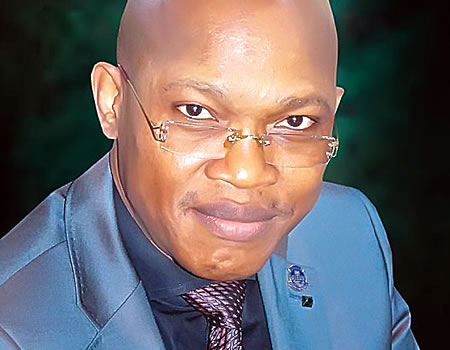A fellow of the Nigerian Institution of Estate Surveyors and Valuers (NIESV), Mr. Victor Alonge, in this interview with CHRIS AGBAMBU and COLLINS NNABUIFE, speaks on the problem of housing in Nigeria, the 17 million Nigerians that are said to be homeless and what government should do to bridge the housing deficit in the country. Excerpts:
What would you say is the state of housing in Nigeria?
The state of housing in Nigeria today, as a matter of fact, is actually not different from the state of housing in Nigeria five years ago. What that means is that we have not made real progress in terms of addressing the housing challenges we have in Nigeria. We have always had these statistics that the housing deficit in Nigeria is 17 million, and that figure has been made constant for over a decade. I’m sure the first thing that comes to our mind is that it can’t be right because we keep growing population wise. Nigeria is close to 200 million, and we have been carrying this ‘17 million deficit’ since our population was estimated to be around maybe 130 million. So, if we have had a population increase to 200 million, will our housing deficit still remain the same? The challenges we have in housing are still there: funding is a major issue, cost of building materials is still high in the market, access to land still epileptic, it is not transparent, and it’s unnecessarily expensive and discouraging even to developers. We have not had a system that promotes honesty in the housing chain. When I say honesty, it is not that the central government have not tried to address the issue but the point is that because of lack of honesty of purpose and the greed of the developers that benefited from government policy, I think we are worse than where we were.
Supreme Court slates May 24 to deliver Judgment in Zamfara, Ekiti suits
In terms of access to land, it is absolutely difficult. There is no policy by the government to actually encourage housing provision. The Federal Ministry of Land has gone back to the system of direct provision of houses to masses, and I wonder how many houses government can build to sell to Nigerians. And the first thing is that we have a very archaic legal framework for accessing housing in terms of finance, in terms mortgage. Those have not been properly addressed by this system. So if you say you are building directly to sell to people on a long term basis, what could be the structure? And in terms of government indirectly providing houses and selling, we have seen that it has not worked, it has never worked in this country and it will not work.
We have other jurisdictions where housing provision has been effectively tackled with proper policy framework without government directly building, but indirectly involving in the process, and that can only work through a system of subsidy. The subsidy will involve access to land, to building materials, to housing finance arrangement and then to acquisition. So, it is a whole lot of thing, and the subsidy will be more of credit to the organisations involved in the housing provision chain rather than giving them cash. That is the way to do it. Social workers for instance, teachers, nurses, journalists and so on are professionals that are needed in any society, they are needed in town, they are needed in the outskirts. What you find out in a system where there is no conscious effort to integrate them into the society is that you will find people working in Abuja, teachers, doctors nurses and so on will be working in Abuja and live in Suleja. So, a conscious effort has to be made so that private developers will reserve a percentage of their development for allocation to essential workers, civil servants, journalists and others.
My own assessment of housing from what I have said is that unfortunately, the situation is still critical and we don’t seem to have a coherent policy as a nation to tackle it.
How many houses do you think Nigeria needs annually to address the housing deficit?
The first thing to do is to have a proper understanding of what is our housing. We know the global standard for housing occupation, but we need to identify the deficit effectively. If we identify the deficit effectively, then we can now say that we want to make sure that these deficits are fully addressed in the next 20 years, we will have our annual figure that we must provide every year to be able to meet that 20-year target. But as at now, it is all about guesswork. That was why I said earlier that we were told that our deficit is 17 million, but that 17 million has been there for decades. So, what we do is to carry out a proper study, I think the government needs to understand that to address the housing situation in the country, it needs to involve the professionals and not just completely rely on the resources available in the civil service. There is a need for private and public sectors collaboration and corporation in coming up with the implementable and robust policy.
If you are made the minister of housing today and you are given a marching order to address the housing deficiency in the country, what will you do?
I have already mentioned the key problems that are making the housing issue to linger. They need to be addressed. Accessibility to land is the most important of the entire problem. If the land is easily accessed and is made affordable, the government has no business in making a profit of the citizen. When citizens live peacefully, comfortably, they will be able to contribute productively to the economy. I think the first thing to do is to look at the accessibility of land because that is the foundation. That is why the professionals including myself have advocated that the Land Use Act must be extricated from the constitution so that it will make its amendment easy. As it is now part of the Nigerian constitution, it means to amend it has to go through the process of constitution amendment, which will be cumbersome. Land as a factor is dynamic, you don’t create that cumbersome process to respond to changes because we are living in a global world. If you deliberately hold yourself back, other nations will not pity you.
The second point is that we need to begin to look at the production of building materials. There is a lot of research work done on local content, but when these researches are done and they are positive, they need policy support to actually make them feasible. Look at the building materials, we have enough indigenous opportunities by producing building materials. We don’t have to depend on imported marble and others, we are talking of housing.
Then we also look at the housing finance framework, mortgage system because when the development finance is friendly, is reasonable, then the mortgage finance system would also be, because when the developers have friendly finance arrangement in terms of cost of funding, it will translate to the cost of those developments, which we will have local building materials that policy now favours and therefore you are able to produce in commercial quantity, price comes down, access to land is easy, affordable. So all these combined the mortgage finance framework will then be affordable.
There are many empty houses seen round yet there is housing deficit. Why?
The point is that the housing in deficit are not houses that are going to be developed in Asokoro or Maitama. Those are private sector development. Those ones are not in the scheme of the housing deficit we are talking about. Those houses are empty and there is nothing government can do about it, it’s like you buying your shares in companies and then keeping them in your house. It is not the business of the government to be building houses. You can influence housing production, but it is not for the government to be getting involved in direct housing production. No matter how passionate they feel about it, it is not the government’s business.
Are you in any form of partnership with the government on housing?
I’m not the President of the institution (NIESV), but I do know that the institution has, in a number of occasions submitted our position to government to collaborate or corporate with the Ministry in coming up with policies that would encourage real supply of housing to the market so that we can reduce progressively the deficits that we have. But it is not for the institution to take the initiative, it is for government to take the initiative. Like I said earlier, the government will need to involve all professions to be able to come up with credible and robust policy framework that will address this housing issue.
So, it’s really a big a problem and unfortunately when they want to do it on their own, it will not work. We need to learn from history. Direct involvement of government in housing, has it ever worked? It will never work in this country. The best way is to create the enabling environment and for government to make use of its strategic position as the custodian of the asset of the nation, as the influencer of national direction to get a policy that will help citizens without actually depending on government to initiate our a process of providing houses for ourselves.
Can’t there be a situation where someone can get a two bedroom apartment for N2 million?
It is possible, but we need to look at the critical elements in the chain and address them. I talked about the biggest problem which is access to land and then building material. Source of finance is also important. So if all these are actually dealt with, and you have a proper mortgage system in place, then N2 million can get a house. But under the current arrangement where there is no clear policy towards assisting citizens to have roof over their head, then you cannot get a N2 million flat.






